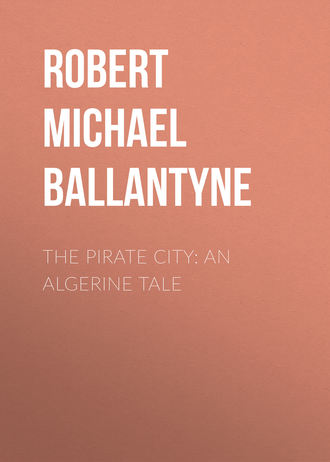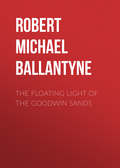
Robert Michael Ballantyne
The Pirate City: An Algerine Tale
Chapter Thirteen.
Relates Something about Improvements, Surprises, and Changes in the State of Affairs
In consequence of the opportune interference of the British consul, and of the good-will which Lucien had inspired in the breast of the Dey, a ray of light stole into the gloomy Bagnio, and tended to cheer at least two of the slaves.
This ray was conveyed by means of the Padre Giovanni, whom we have elsewhere mentioned as being the friend and benefactor of the slaves.
Previous to his visit a cloud had overshadowed the prison. Several chaouses had entered, and, after loading Castello and the other runaways with chains, had led them forth to death. It would be painful as well as unnecessary to detail the terrible tortures under which these wretched men perished. The remaining slaves knew well the nature of the fate that awaited them, and the blank caused by the disappearance for ever of their well-known faces, was fitted to restrain all thoughts of rebellion, had such existed. Some surprise was felt at first by all the slaves at the delay of punishment in the case of Francisco and Mariano, but after the first hour or two had passed, they ceased to give the matter a thought.
When, therefore, the old man Giovanni entered the Bagnio and informed these two that the Dey had reprieved them, and commanded their attendance at the palace, their surprise was re-awakened, and speculation as to the cause of such unusual proceedings was revived.
“I am the bearer of still further tidings,” said the old man, taking a letter from a sort of wallet that hung from his shoulder, and handing it to Francisco.
“From Juliet!” exclaimed Francisco, tearing it open and reading aloud eagerly:—
“‘Dearest Father,—It is not possible to express to you the agony that we endured on hearing that you had been taken captive by the Algerines. Oh, why are such monsters allowed to live? (“Why, indeed!” interjected Francisco, bitterly.) But take comfort. God watches over us all. Some of your old friends here have begun to collect money for your ransom, and I work hard to increase the sum—but oh! how slowly it grows! Even darling grandmamma has got some light sewing work which brings in a little. But our hearts mourn because of you. We earnestly hope that the pirates treat you well, (“Thank God they do not know anything about that,” muttered Francisco), and we feel almost sure that they do, because we have been told that they are careful of the slaves who, they hope, will be ransomed. I have therefore written to the Dey—how I hated him while I wrote the humble letter!—telling him that we hoped to raise the sum in a short time. Every one here is very kind and sympathises with us, besides giving a contribution to the fund.
“‘This letter goes by a French vessel which is to touch at Algiers, and which conveys a priest who has a large sum of money with him to ransom Sicilian and other slaves. I entreated him to ransom you with part of it, but he smiled pitifully, and said the money had been raised by the friends of particular slaves, some of whom had been many years in captivity, and that it could not be diverted from its proper objects. How my heart sank when he spoke of some being in slavery for many years! But it was cheered again when I reflected how hard we are all working to raise the money for you and Lucien and Mariano. We send you all our dear love.—Your affectionate daughter.
“Shall I have an opportunity of answering this?” asked Francisco, eagerly.
“Yes; I am about to conduct you to the palace, where your son Lucien—who, I may mention, is a favourite—awaits you.”
“You mustn’t let them know the truth, father,” said Mariano earnestly.
“Would you have him tell them what is false?” asked the Padre gravely.
“No, no,” replied the youth, with a laugh, “but there is no occasion to mention all that we have suffered, you know; and there is a good deal—I mean a little—that is agreeable to communicate. For instance, this very summons to the palace, and Lucien’s good luck.”
“Trust me, lad,” said Francisco; “I won’t fail to cheer them if I can, and you may be sure I won’t exaggerate our misfortunes.—But lead on, old man; I am anxious to get out of this foul den as quickly as—”
“Forgive me, comrades,” he added, checking himself, and turning to the slaves near him; “I am grieved more than I can tell to leave you behind. If by remaining I could lighten your sorrows, I would gladly do so. It may seem presumptuous in one who is himself a slave to say so, yet I can’t help assuring you that if the Almighty is pleased to give me any power in this city, I won’t forget you.”
This speech was received with a kindly nod by some, and a laugh of scorn by others.
Probably the latter had heard similar sentiments before from somewhat kindred and hearty spirits, and had learned from sad experience that nothing ever came of their good-will.
Following the old man, the father and son were soon in the presence of Lucien, who received them, as may well be believed, with a full heart.
“God bless you, my son,” said Francisco, “for well assured am I that it is through your influence that we are here.”
“It is through the influence of the British consul,” replied Lucien.
“Well, I pray for a blessing on you both, for it is useless to tell me that you have had no hand in it.”
“I do not say that I had no hand in it. On the contrary, I wrote out the order for your acquittal; and,” added Lucien, with a peculiar smile, “I also had previously written out your and Mariano’s death-warrant!”
“You are jesting, lad,” said Francisco.
“Indeed, I am not,” returned Lucien, relating the circumstances of the whole matter to his astonished and somewhat horrified auditors.
“And now,” he continued, “I must let you know your destination. Don’t be disappointed. You must remember that we are slaves, and have just been delivered from the Bagnio. The Dey seems to have taken a fancy for me—”
“I don’t wonder,” interrupted Mariano enthusiastically, seizing and squeezing his brother’s hand.
“And,” continued Lucien, “he has permitted me to select situations for you. I have arranged that you, father, shall be my assistant in the secretary’s office, and that you, Mariano, shall be shopman to Bacri the Jew.”
Lucien looked awkwardly at his father and brother as he spoke, feeling uncertain, no doubt, as to the manner in which they would receive this information. He was therefore rather relieved than otherwise by a smile on the face of Mariano.
“Why, Lucien,” he said, “I always thought you a great original, and this last display of your powers confirms me in my opinion. Not that I deem it strange your having appointed father your clerk—for, in the circumstances, it would have been charity to have appointed him even to the office of shoe-black—anything being better than the Bagnio,—but what wild fancy induced you to make me shop-boy to a Jew?”
“That,” replied Lucien, “you shall find out in good time—only, pray, remember that I am not the Dey’s Grand Vizier, and have not many places to offer.”
“Well, well, be it so,” returned the other; “I am well content with what your wisdom provides.”
“And so am I,” said Francisco, cheerfully. “I suppose you will feed us better than we have been fed of late?”
“That will I, father, but there is no pay attached to your offices, for slaves, you know, get no wages.”
“They get splendid habiliments, it would seem,” observed Francisco, regarding his son with twinkling eyes. “But come, Lucien, I am all impatience to begin the work of under-secretary of state! You bear in remembrance, I trust, that I can read and write nothing save my mother tongue?”
“Yes; Italian will suffice, father; such of the duties as you fail to perform I can easily fulfil.—Now, Mariano,” he said, taking his brother aside, and speaking in a low earnest tone, “see that you act wisely in the situation I have selected for you. The Jew is a kind, good man, despite what is said about his worship of Mammon. I would that all in this city were like him, for in that case we should have no slavery. During the short period I have held my office, my eyes have been opened to much that I may not mention. There, the very walls of this palace have ears! I have said enough. You remember Angela?”
“Remember her!” exclaimed Mariano, with a deep flush and a look of intense surprise, “how can you ask me, Lucien?”
“Well, you will hear of her from Bacri. Good bye—go!”
He rang a bell as he spoke, and ordered the slave who answered the summons to lead Mariano to the abode of Bacri; at the same time he took his father’s hand and conducted him to his office or bureau.
Amazed at all that had happened, particularly at his summary dismissal by his brother, the youth followed his conductor in silence, and in a short time reached the iron-bolted door of the chief of the Jews.
“This is Bacri’s house,” said his guide in Italian, and, having discharged this duty, he turned on his heel, and abruptly left him.
Pausing a moment to think, and finding that the more he thought the less he seemed to be capable of thinking to any purpose, Mariano applied his knuckles to the door.
For a youth of his character it was a timid knock, and produced no result.
Mariano was one who—in peculiar circumstances, like those in which at that time he found himself—might once in a way act with timidity, but he was not the man to act so twice. Finding that the first knock was useless, he hit the door a blow that caused the old house to resound. In a few seconds it was opened slightly, and the face of a beautiful girl in Jewish costume appeared.
If Mariano had been suddenly petrified he could not have stood more rigidly motionless; amazement sat enthroned on his countenance.
“Angela!”
“Signor Mariano!”
The words in each case were followed by a deep flush, and Angela retreated.
Of course Mariano advanced.
“Excuse—forgive me, signorina,” he exclaimed, taking her hand respectfully. “I did not know—of course I could not—how was it possible that—the fact is, I came to see a Jew, and—and—”
“I’ve found a jewel,” he might have said, but that didn’t seem to occur to him!
“Bacri—that’s his name!” continued Mariano. “Is Bacri within? I came to see him, but—”
“Yes—Signor Bacri is at home,” said Angela, much confused by the youth’s confusion, as well as by the sudden and unexpected nature of the meeting. “But your father—and brother Lucien—Oh, I hope they are well; that they have not been treated cruelly; that they are not in that dreadful Bagnio, of which I have heard so much,” said Angela, at last finding the use of her tongue.
They were interrupted at this point by the appearance of Bacri himself, who welcomed the youth to his house, said that he had been told by Lucien to expect him, and introduced him to his wife and the other members of his family.
Thereafter the Jew took his new shopman into his private apartment, and made many strange revelations to him in regard to the affairs of the piratical city, as well as about the details of his new appointment, in regard to which we shall say nothing here; but it may be well to add that Mariano finally retired for the night well satisfied with the wisdom of his elder brother.
For some time after this, things went well with those actors in our tale in whose welfare we are chiefly interested.
Francisco proved himself to be an able clerk—when assisted by his superior!—and Mariano became a most willing and useful shopman—with the prospect before him of returning each night to bask in the sunshine of Angela’s countenance!
At the consul’s residence Paulina was as happy as was possible in her sad circumstances, for she became very fond of Mrs Langley, and was a perfect treasure in the house,—not only taking a large part of the management thereof, but keeping watchful guard over the dangerous Zubby, so that that Zaharan specimen of humanity inflicted a perceptibly smaller percentage of bumps on the head of Master Jim than in former times. Paulina’s baby, too, began to indicate signs of intelligence by crowing, knocking over whatever it came within reach of, and endeavouring to dig the eyes out of every one who permitted familiarities, especially the eyes of Master Jim, who, it is but fair to add, soon displayed superior capacity in the same line, so that the parents agreed mutually that they would soon be sweet playmates to each other, and that they were the most delicious babes that ever were or could be born. Ted Flaggan also remained a happy inmate of the consul’s abode, awaiting the arrival of a British vessel which might enable him to depart, but not at all anxious for that consummation, and, in the meantime, making himself generally useful.
Down at the Marina, too, the state of things was a little, though not much, improved. Another guardian of the slaves had been appointed,—the former one having been strangled on account of some wickedness reported by enemies to have been done by him, and of which he was afterwards found to be entirely innocent.
His successor was a man of better nature, who, although he kept the slaves hard at their toil, and did not abate the lash or bastinado, nevertheless supplied them with occasional comforts, such as an extra roll of bread when extra work had to be done, or even a glass of spirits when, as was often the case, they were called up at nights, in drenching rain and cold, to protect the shipping in the harbour, and prevent wreck, when sudden gales arose.
Thus the aspect of things in the pirate city, bad though it was, became a little brighter, and continued so for some time, until an event occurred which flung a darker cloud than usual over the ever changing scene.
Chapter Fourteen.
The Plot thickens, and Mariano’s Forbearance and Courage are tested
When the commander-in-chief of cavalry condescended to pay a visit to a Jew, it was a sign that events of considerable importance were hovering in the air. The approach, therefore, of Sidi Hamet to the residence of Bacri one night, under cover of the darkness, was regarded by the Jew with feelings of misgiving, which caused his face to become suddenly very grave, as he looked through the little iron-bound hole, or window, which commanded a view of his court.
The Aga carried no light, although the laws ordained that all who moved about after night-fall should do so; but Bacri knew him as well by his outline and gait as if he had seen his face in the sunshine.
Descending the stair at once, the Jew opened the door and let him in.
“Thou art surprised, Bacri?” said Hamet, swaggering into the skiffa, where Angela chanced to be at work at the time.—“Ha! thou hast a pretty daughter,” he added, with a gaze of insolent admiration.
“The girl is passing fair,” replied the Jew, opening the door of his study, and purposely avoiding the correction of the Aga’s mistake. “Please to enter here.”
Hamet obeyed; remarking as he passed that the girl were worthy of being the wife of a Dey, if she had not been a Jewess.
“Bacri,” he said, sitting down, while the master of the house stood respectfully before him, “thou knowest the object of my visit—eh? Come, it is not the first time thou hast had to do with such as I. The plot thickens, Bacri, and thou must play thy part, willing or not willing. Say, how much is it to be?”
“How much do you demand?” asked the Jew.
The Aga rose and whispered in his ear.
“Impossible!” said Bacri, shaking his head decidedly.
“How, dog! impossible?” exclaimed the Turk sternly. “Dost know that I can let the whole Turkish army loose on thee and thy false-hearted race?”
“My race is maligned alike by Mohammedan and Christian,” returned the Jew, with dignity. “You know full well, Sidi Hamet, that the sum you have named would ruin all the Jews in the town. If the security of my people is not to be purchased for a smaller sum, we must perish. My utmost efforts would not avail to raise more than the half thereof within the specified time. You may indeed ruin us, if you will, but it were wise to remember that if you kill the goose that lays the golden eggs, there will be no more golden eggs to lay.”
“True, O Bacri,” returned Hamet, laughing; “thou art wise, and I shall act on thy wisdom—having first, however, acted on mine own when I demanded double the sum I expected to receive, knowing thine inveterate tendency to drive a hard bargain! Now, good-night,” he said, rising and leaving the room.—“Ha! thy pretty daughter has fled. Well, we shall hope to see her again. Mean while, have a care; our plot is in your hands, but thine every movement shall be watched from this hour, and if a note of warning escapes thee, thou art but a dead man!”
Saying this, the Aga departed, and Bacri, returning to the skiffa, summoned Mariano, who had been engaged in another part of the house when Hamet entered.
“Come hither, lad,” said the Jew, while a careworn expression seemed to settle on his handsome features; “I have work for you to do which requires courage and speed. Hamet the Aga—I may say, the black-hearted Aga—has been here on an errand which I have been looking forward to for some months. You may be aware, perhaps, that in this barbarous city there is no hereditary succession of Deys. Each Dey is elected by the Turkish janissaries from among the men of their own ranks; one result of which is that various factions are kept up in the army, and the most vigorous man among them, the one who can command the greatest number of admirers and followers, generally wins the unenviable but much-coveted post. When the reigning Dey becomes unpopular, the factions begin to ferment; and, instead of waiting for him to die, they invariably strangle, poison, or behead him. The factions generally have some disturbance among themselves, but in any case, the consequence of a revolution of this kind is, that complete anarchy prevails in the city, and, until a new Dey is elected by the janissaries, the Moors and Jews are at the mercy of the rude soldiery. Of course, all who have enemies among them hide themselves and their pelf, if possible, until the anarchy ceases, which it does the moment the green standard of the Prophet is hoisted on the terrace of the palace, announcing that a new Dey is seated on the warm throne of his not quite cold predecessor.
“I tell you all this,” continued the Jew impressively, “that ye may understand what is about to happen and know how to act. It is a sharp ordeal to go through, but a short one; the scene of violence lasting usually but one day. Still, that affords ample time for irreparable injury to be done.
“It is usual, just before a revolution, for the dominant faction to make an arrangement with the persecuted Jews, so that, in virtue of the payment of a large sum, their families and possessions may be spared. Of course, we are compelled to agree to this, and even compliance does not always secure us, because when violent men are once let loose, they often become unmanageable for a time, even by those who command them. Still, the payment of this unjust tax is our only safeguard. This evening, Sidi Hamet, the commander-in-chief of cavalry, has been here to make the arrangement with me. I have long known of his designs; indeed, we Jews know nearly all the secret plots that go on around us; for gold is potent, and we have those who are willing to give us information both in the palace and in the casba. I likewise know that Sidi Omar, whom you may have seen, also aims at the throne; but he has no chance against his rival Hamet, who is a more powerful man in mind and body, besides being younger. Your old enemy Sidi Hassan has agreed to assist Hamet, who has promised to reward him with the office next in dignity to his own. I have more than once warned Achmet of what is plotting, for he has been kinder to my people than most of the Deys who preceded him, but he is strangely slow in guarding himself. He is a bold, fearless man, and perchance trusts too much to a popularity which for some time has been on the wane—chiefly, I believe, because he is not a sufficiently unprincipled villain to please the taste of the lawless crew over whom he reigns.”
“This is a dreadful state of things!” said Mariano, who had listened to the narration in silent amazement.
“It is indeed dreadful,” returned Bacri, “and yet, although the European powers must be thoroughly aware of it, through their consuls, this is the state of things that they not only tolerate, but absolutely sanction by the presence of their representatives and the payment of tribute.”
“Tribute!” exclaimed Mariano, in a tone of indignation, “is it possible that tribute is paid by the great powers to these miserable pirates?”
“Even so, young man,” answered Bacri, with a smile, “just as we Jews pay them tribute to avoid being pillaged—only, without having our excuse. We are compelled to do it; but no one can suppose for a moment that a small power like Algiers can compel nearly all the maritime nations to bow before it. Nevertheless, the nations do submit, some of them to very humiliating terms. You saw the Swedish frigate conveying two store-ships that entered the port yesterday?”
“Yes.”
“Well, these vessels contained the annual tribute due by Sweden, and that country is also bound by treaty to furnish the Dey with a person capable of directing his gunpowder factory! Denmark not only pays tribute, but is bound to pay it in naval stores, and her consul here is at present in disgrace because his country has failed to pay its tribute at the specified time. There is an American ship just now detained in port because the nation to which it belongs is also dilatory in paying up what is due by treaty, therefore the American consul is also in the Dey’s black books; and I may add in regard to him that, at the time of his appointment to his office, he gave the Dey a consular present of sixteen thousand Spanish dollars. Even that notorious warrior Napoleon, who is at present turning Europe upside down, thought it worth his while lately to send to the Dey a present of telescopes and other things to the amount of four thousand pounds; and England, that great nation which styles herself mistress of the seas, cannot enter the Mediterranean with her merchant ships until she has paid toll to this exacting city.”
“Now,” continued Bacri, stopping abruptly in his account of these matters, “I must not waste more time on a subject which is incomprehensible. Indeed, I would not have said so much were it not that the hour is yet too early for the undertaking which I have in view for you.
“Achmet, then, must be at once put on his guard; but to do so is no easy matter, for his enemies surround him. It would be impossible for me, or any one sent by me, to gain admittance to him. I am already under surveillance, and should forfeit my life were I to attempt it. The only method I can think of is to send to the British consul, and let him know what is pending. He is the only consul here to whom the Dey will grant an immediate unquestioning audience. You are active and strong, Mariano, and are, I believe, willing to aid me.”
“Indeed I am,” replied the youth fervently.
“I need scarcely tell you,” said Bacri sadly, “that you and your friends are intimately concerned in the safety of the present Dey, for if he falls it will go ill with all connected with him, especially with the Scrivano-Grande, your brother Lucien, and your father.”
“I guessed as much,” said Mariano, with an anxious look; “but, tell me, is there likely to be much danger to this house and its inmates?”
“I think not, I hope not, Mariano, but there is no place of absolute safety for me or mine in the city. I might indeed take refuge in the British consulate, but I prefer to remain where I am, and put my trust in God.”
“Then you and yours,” returned the youth, with hesitation, “may want the aid of a stout and willing arm. Is it well that I should leave you at this crisis?”
“Fear not; I think there will be ample time for you to go and return, if you make haste,” said the Jew.
“Then let me go at once,” urged the other.
“Not so,” answered Bacri; “we must proceed wisely as well as with caution.—Go, Angela,” he said to the maiden, who entered the room at that moment, “open the closet at the head of the terrace stair; you will find a thin knotted rope hanging there,—fetch it hither.”
In a few minutes Angela returned with the rope.
“Sit thee down, pretty one,” said Bacri kindly, “while I give this youth some directions. I will explain to you afterwards the cause of his being sent away.—This line, Mariano, is all you need. It is long enough to reach from the city walls to the ground. You will go towards the tower to the west of Bab-Azoun gate. There is an iron spike on the wall there, on which is fixed the head of your poor friend Castello. Fasten the rope to the spike and lower yourself. The ground reached, leave the rope hanging, it will serve for your ascent on returning; then speed round the back of the town, and over the hills by Frais Vallon to the house of the British consul, tell him of the urgent need there is for his seeing the Dey and letting him know the danger which hovers over his head, and then return as fast as possible. This rope you will find suitable to its objects. An active young fellow like you can have no difficulty in re-mounting the walls with the aid of these knots, and you need not fear interruption if you exercise ordinary caution, for Turkish soldiers, like the warriors of all nations, become arrant cowards when supernatural fears assail them. Poor Castello’s head will keep the nearest sentinel as far off as is consistent with his duty. No doubt they are well used to trunkless heads in this city, but there is a vast difference between the sight of such in the glare of day, when surrounded by comrades, and amid the excitement of war or an execution, and a similar head in the stillness of a calm night during the solemn hours of a long and solitary watch.”
“But why not allow me to start off at once?” asked Mariano, with some impatience at the Jew’s prolixity.
“Because the sentinels will not be relieved for an hour yet, and it is well to make such an enterprise as near to the relief as possible—wearied men at the end of a long watch being less on the alert than at the beginning of it. Besides, the moon will be lower in half an hour, and that will favour your enterprise.”
Being constrained to wait, Mariano busied himself in making the useful preparations. He wound the rope tightly round his waist, and covered it with a thin scarf such as was commonly worn by the Moors. He also trimmed and prepared a small lantern.
“Now,” said Bacri, looking at his watch, “you may go. But, stay—not in the direction of our usual passage. You could not move ten yards from my door to-night without being intercepted. Follow me; I have long been prepared for emergencies such as this.”
“Good-night, Angela,” said Mariano, extending his hand, as he prepared to follow the Jew.
“Oh, be careful,” said Angela earnestly. “From the little I have heard it seems that there is much danger impending.”
“What I can do to avert it shall be done,” replied the youth, kissing his hand to the girl as he passed through the doorway and followed his master to the terrace-roof of the house.
We have said that Algerine roofs are flat, but they are by no means regular. There are often various elevations on the same roof, and various forms, as if the architect had terminated the summits of the several walls and partitions at the dictates of a wayward fancy rather than a settled plan. In some cases a step—in others a flight of steps—formed the communication between one part of a roof and another, while division-walls varying from a foot to two yards in height, cut it up into irregular squares and triangles. Such roofs are eminently fitted for the game of “hide and go seek,” to which, doubtless, they have been applied more or less since the days of Abraham.
Issuing on the terrace of his house, then, Bacri pointed out to Mariano, by the light of the moon, which was slowly descending to its bed in the Sahel hills, that the roof of his neighbour’s house could be easily reached by a single step.
“You will cross over this roof,” he said, taking a ring from his finger and placing it on that of his slave, “and be sure that you tread with care until you come to the other edge of it, where you will be able to place yourself in the shadow of a chimney until a cloud covers the moon. My neighbour is not a friend, therefore tread like a cat. Attend well to my directions now, and obey them implicitly. You require no arms. Whatever happens to you, offer no resistance, as that will only ensure death. When the moon is clouded leap to the next roof, which you may see now in line with yonder minaret. There is about six feet between the two—which is nothing to a youth like you; only be careful, for failure will plunge you into the street, sixty feet below. That terrace gained, you are on friendly ground. Go, knock gently at the door leading to the house below, and show the owner my ring, asking him at the same time to guide you to the street, after which you know how to act; and may the God of Abraham direct you. Stay! If the owner of the house, who is a Jew, should use you roughly, heed it not. Whatever you do, be passive. Your own life, and it may be the lives of others, depends on this.”
The first part of the Jew’s caution would have availed little, for when Mariano was roused he recked little of his own life; but the reference to others reminded him of Angela and his father, so that he made up his mind to be a very model of forbearance whatever should happen.
Stepping easily from the house of the Jew to the terrace of his neighbour, he proceeded with extreme caution to the chimney pointed out to him, and took his stand under its shadow.
It was a time and situation which induced many burning thoughts and sad reflections to chase each other through the youth’s brain, as he awaited impatiently the clouding of the moon. From the elevated point on which he stood nearly the whole city lay spread out at his feet, its white terraces, domes, and minarets shining like silver in the pale light, and contrasting vividly with the dark blue bay lying between it and the distant range of the Jurjura mountains. Everything was profoundly calm, quiet, and peaceful, so that he found it difficult to believe in the fierce passions, black villainy, horrible cruelty, and intolerable suffering which seethed below. For some time his eyes rested on the palace of the Dey, and he thought of his father and Lucien with deep anxiety.







